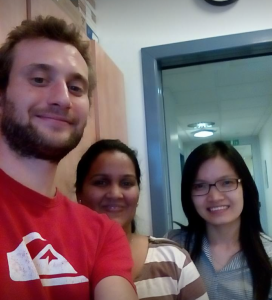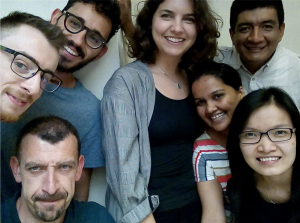As a means to standardise the microtitre DST technique deployed in CRyPTIC and train staff conducting the tests in each participating institution, a training course took place in Milan, in the summer of 2016. Those were busy days where protocols were optimised and shared between the Milanese team and scientists from Peru, Vietnam, South Africa, India, Singapore, England and Germany. Sarah Lehmann, a scientist representing IML red GmbH—the Institute of Microbiology and Laboratory Medicine in Gauting, part of WHO’s SRL network—tells us about this experience:
“On June 6th-8th and 13th-15th two 3-day training sessions on DST where held at the laboratory of Daniela Cirillo in Milan. Representatives of each collaborating center undertaking the DST validation phase of CRyPTIC met in Italy for a training in inoculum preparation, inoculating the microtitre plates, plate reading and interpretation of results and recording data, as well as data entry in a consistent manner between all international project sites.
Thanks to Daniela who made the training possible in her laboratory in Milan and to Lele for receiving us cordially, supervising the training and discussing plate reading results. We all were able to spend informative and productive days in Milan. Lele, Matteo and Marco from the team in Milan gave us an excellent and insightful training. For some of us it was the first instruction on how to handle the Thermo Fisher equipment. The guidance by Matteo and Marco was very clear and detailed so that everyone could follow the protocol well, independent of their level of expertise. Great importance was attached to biosafety issues and handling of MTB strains safely. For me it was especially interesting how to handle the AIM automated inoculator and dosing heads, manual plate reader and Vizion MIC digital viewing system. How to prepare an inoculum was nothing new for the most of us, but the session on how to interpret the results and the individual differences depending on who was reading the plate proved to be especially interesting.
Another very nice aspect of the training was, we also could discuss future matters that could occur whilst conducting the DST at each collaborating site and we were able to already agree on several issues regarding that matter. Ana and Sarah organized traveling, accommodation and all other organizational matters so perfectly, that we all enjoyed the days a lot, thank you very much for that. They also provided us with deep insights into the background of the whole CryPTIC project.
Besides the extensive and highly informative DST training in the lab, the training activity gave us all a great platform to get to know each other better. It was a great pleasure to meet scientists from other project sites around the world, as well as Sarah and Ana from the CRyPTIC project management in person. The interaction among the different participants was very close and I am sure that this training activity laid a cornerstone for future fruitful collaborative interactions also in course of the project.”
Thank you for your contribution Sarah!


Left: Andrea Cabibbe (molecular biologist at San Raffaele Scientific Institute and WHO consultant), Priti Kambli (Hinduja Hospital, Mumbai) and Nhung Hoang Ngoc (Oxford University Clinical Trials Unit in Ho Chi Minh City, Vietnam); Right (clockwise from left upper corner): Matteo Chiacchiaretta and Marco Rossi (respectively, research fellow and biomedical technician at San Raffaele Scientific Institute), Ana Gibertoni Cruz (CRyPTIC research fellow at Oxford), Jorge Coronel (lead laboratory scientist at Universidad Peruana Cayetano Heredia), Nhung Hoang Ngoc, Priti Kambli and Emanuele “Lele” Borroni (senior microbiologist at San Raffaele Scientific Institute).
ALGC

